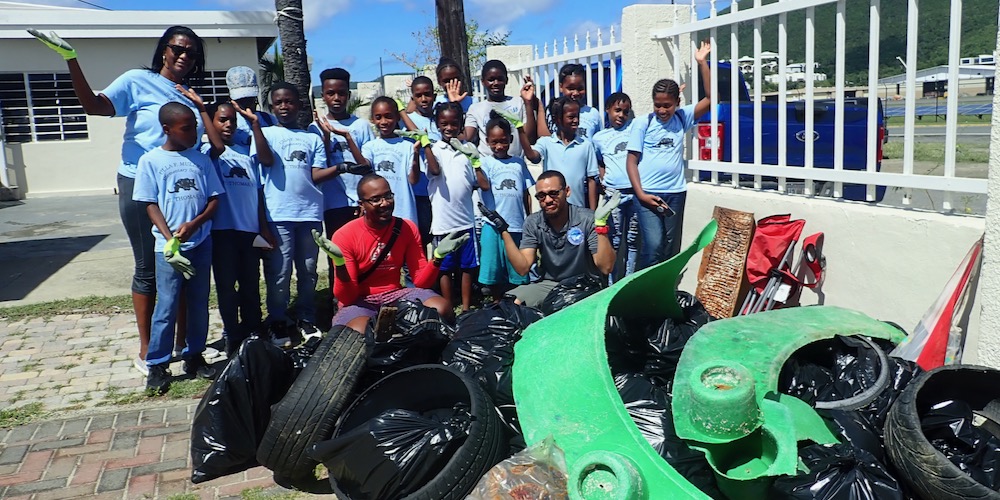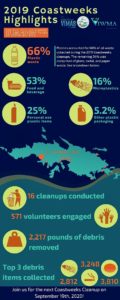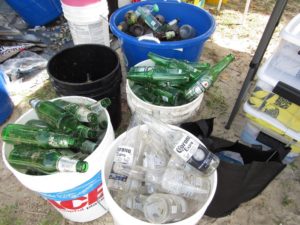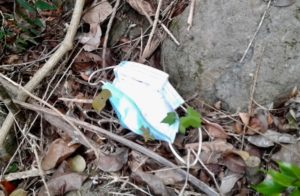
Coastweeks, an annual beach cleanup event, will have to be delayed this year due to the coronavirus pandemic.
During Coastweeks, the U.S. Virgin Islands contributes beach cleanup data to the International Coastal Cleanup, which is organized by the Ocean Conservancy. The territory has provided data to the cause since at least 1988, with 2017 – the year of the twin Category 5 hurricanes – being the only year that the territory couldn’t since it started 32 years ago.
In 2019, Coastweeks volunteers removed 20,000 individual pieces of trash with a combined weight of 2,220 pounds from the shores of the V.I.
A major reason for the postponement was the amount of people these cleanups attract and while the cause of making sure V.I. beaches are clean and contributing to the international data set is important, organizer Howard Forbes Jr. didn’t want to disobey Gov. Albert Bryan Jr.’s stay-at-home orders. Even though those orders have been slightly relaxed, the goal of curbing the spread of coronavirus takes priority.
One cleanup last year drew more than 200 participants, well over what is considered a large gathering during the pandemic. When the time is right to do the cleanups, Forbes said the teams of volunteers will most likely be capped at 50 people, and people will be encouraged to group off with people they live or work with already to limit the potential spread of coronavirus.
The event usually attracts around 1,000 volunteers over several cleanups during a six-week period that usually begins on the third Saturday of September until the end of October. The territory has until the end of December to turn in the data, so there’s a chance that if the number of COVID-19 cases decline, similar efforts can be completed, albeit in smaller groups with different guidelines to prevent the spread of the virus at these events.

Forbes, the coordinator for the Virgin Islands Marine Advisory, helps organize the event with the help of site captains, who are assigned different beaches and supervise the cleanups. For example, the Virgin Islands Montessori School & Peter Gruber International Academy is usually assigned to Vessup Beach, while Kristina Edwards, the education and outreach coordinator for Coastal Zone Management at the Department of Planning and Natural Resources, is responsible for the efforts in town.
Cleaning up the beaches adds to the beauty of the Virgin Islands, and the data is important because it provides hard data that can show how serious a problem is and why more laws need to be made and enforced to protect nature.
Forbes said that a rewarding part of the experience of Coastweeks is “being able to see more and more people realizing that trash, marine debris is a problem.”
Participating in a cleanup like this is a firsthand way people can see that trash on the beaches is a problem, which he hopes will persuade people to be more conscious and not contribute to the problem.
Valerie Peters, a site coordinator at Coki Beach, agreed, calling Coastweeks, “Great teaching opportunities to create community awareness of consumption and waste issues in the territory.”

There are some differences between the top-10 most collected items in the territory and internationally, but the common theme is that most of the items are plastic. In the 2019 Virgin Islands data, 18,000 of the 20,000 pieces of trash were plastic. The majority of the plastic items are food service waste items such as plastic utensils, take away containers, beverage bottles and bottle caps.
Forbes shared a video of a plastic water gallon jug being broken down to show how these larger plastic items break down into microplastics. When the plastic gets exposed to sunlight a chemical reaction occurs that makes it brittle to the point that any pressure will cause the plastic to disintegrate into smaller pieces that are more difficult to clean up and easier for small fish to eat.
“These larger plastics don’t disappear, so it’s not like a banana peel that is going to break down over time and turn back into soil and fertilizer and be good for the environment,” Forbes said. “These plastics are going to stick around forever or a very long time.”
Turtles and other large marine animals swallow plastic bags and other plastics. The microplastics end up in the food chain.
“Small fish eat the microplastics, the bigger fish eat the small fish and ultimately we eat those large fish,” Forbes said.

When cleanup efforts resume, Forbes said it may be interesting to see if there’s been a change in the types of trash found. The trash that is created by beach gatherings that tend to have a lot of food service items may be lower, but there could be a new problem. In between the two stay-at-home orders Forbes did a nature trail hike and noticed a lot of disposable masks.
With no set cleanup date in sight, Edwards had thoughts on what residents can do even during the pandemic to protect the environment.
“With all that’s going on in the world, I hope that residents take the time to appreciate the amazing islands we live on and consider how we can help protect these natural resources,” Edwards said. “Take a walk, enjoy the view and bring a reusable bag with you to collect the trash you see along the way. We have to think about how lucky we are to live here and consider every day what actions you can take as an individual to reduce your impact on the environment. Remember to refuse, reduce and reuse. Stay safe and I will see you at the next beach cleanup.”





